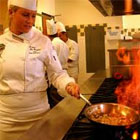
Zebra
Somewhere in, NJ
Male, 62
I've officiated football for over 30 years, now in my 26th on the college level. I've worked NCAA playoffs at the Division II and III level. In addition, I've coached at the scholastic level and have been an educator for over 35 years. I have no interest whatsoever in being an NFL official! Ever!
I don't get paid enough to mediate my family's problems. I don't get paid enough to officiate football, either, but I WANT to be there.
To the best of my knowledge, that has never happened. And I don't think it should. If you open that can of worms and set a precedent for changing results after the fact from what occurred on the field, there would be no end to the challenges. It would call into question every decision, every call, every outcome. The old saw goes, 'It's a game played by humans and judged by humans'. You have to live with certain things. And as a side note, the official who made the call apparently is publicly saying he was right. Heard that on the radio this morning.
Well, if you judge abuse by what the replacement refs were taking, then yes, we take a lot. But look at baseball. Kicking dirt, going nose-to-nose with an umpire. I know coaches/managers can be ejected, but umpires take a lot, probably more than in any sport. A lot of this goes back to communication and control. You need to communicate with the coach about what is going on. They have a job to do and so does the official. The coaches will say a lot, usually about a missed call. But eventually they have to coach. Sometimes they'll keep going and then communicating with them is the key. "Coach, I'll watch for that", or "Coach, I'll find out what the other official saw as soon as I can". If they keep harping, the best thing to say is something like, "Coach, I know you're upset, but if we keep going back to that play, you're going to cause me to miss the next one" or, ultimately, "Coach, we have to move on. that one is over". Many coaches, especially as you move up in level, are pretty smart. They'll come over to you and more quietly say something on-on-one so no one else hears it. And contrary to popular opinion, they really don't question your heritage or parentage. The rule of thumb for officials: if no one else hears it, then it's just between you and the coach. But if he really goes off, and your mom, who you invited to the game and is sitting right behind the team, hears it, then you can flag him for unsportsmanlike conduct. But truthfully it doesn't happen very often.
Uhh, you do agree. There are no "do overs" because officials can't agree. And when push comes to shove, that is why the white hat is there. There will be plays (need I remind you of Seattle-Green Bay) where two officials see it differently (e.g. catch-no catch on a pass that is close to the ground). You confer. Someone has to convince the other. And, as I said, the referee is there to mediate and guide the discussion. On a pass play, for example, the college axiom is 'when in doubt, wipe it out'. But that assumes there is no replay (it's not available at Division II or III) or that there is no clear opinion from both officials. Be assured, there will be a decision.
Starbucks Barista
 Why does Starbucks attract so many homeless people?
Why does Starbucks attract so many homeless people?
Toll Collector
 What happens when a car blows past a tollbooth without paying?
What happens when a car blows past a tollbooth without paying?
Chef
 Do you get offended when a customer sends back a dish?
Do you get offended when a customer sends back a dish?
Good question and very interesting. There is no question that the Monday night game with the controversial ending was a catalyst to get the deal done. But I think the NFL was in a unique position. It is, with some contrary notions, the most popular sport. There is heavy gambling on the NFL (not that the league "worries" about Las Vegas books), so it garners a lot of attention. But not every call made during the lockout was in error. And not every replacement official was bad or didn't belong at that level. You can find very competent replacements - the NFL, as I noted in another posting, did not use highly competent Division 1 officials who MIGHT have done a better job. If the NHL locked out its officials, what kind of outcry would there be? With all due respect to hockey fans everywhere, if an NHL game was messed up by a replacement official, how much would you hear about it? Take it a step further: Major League Soccer?
No. And if I was offered, I certainly hope I would have the character and integrity to say no. And then to turn the person in to the appropriate authorities.
Short answer: no. Referees have to know the rules, the enforcement, and need to have the ability to speak clearly and extemporaneously. Every situation is a bit different so you can't have a script. The easy stuff is natural: "Holding, on the offense, number 75. Ten yard penalty, repeat second down". But you can get a bit involved, too. "We have multiple fouls on the receiving team on the return. Block in the back, number 29; that foul is declined. Holding, number 43. That foul is enforced at the spot of the foul. First down." You can't script all that. There are some things that supervisors want and don't want said in the announcements. For example, with the current concern about concussions, there are more fouls for helmet-to-helmet contact. But you shouldn't be hearing the phrase "helmet-to-helmet". The national college supervisor does want the term "targeting" used, as in the head, or the player, was targeted by the hit. But don't use helmet in the announcement. Noted NFL referee Jerry Markbreit tried to prepare for the unusual. In his book, he recounted how he would create crazy plays and their related fouls. He would then "announce" the foul, practicing announcing it while looking at himself in the mirror. As the story goes, one game he had a weird, wacky, and very convoluted foul. He gets on the mike and announces it clearly and concisely. He later gets a call from someone who says what a great job he did explaining the foul and its enforcement. They asked Markbreit how he could explain that play so well and on TV no less. His answer: "I practiced it".
-OR-
 Login with Facebook
Login with Facebook (max 20 characters - letters, numbers, and underscores only. Note that your username is private, and you have the option to choose an alias when asking questions or hosting a Q&A.)
(A valid e-mail address is required. Your e-mail will not be shared with anyone.)
(min 5 characters)
By checking this box, you acknowledge that you have read and agree to Jobstr.com’s Terms and Privacy Policy.
-OR-
 Register with Facebook
Register with Facebook(Don't worry: you'll be able to choose an alias when asking questions or hosting a Q&A.)